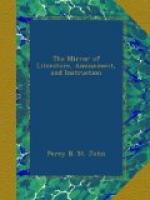There rusted amid heaps of broken stone
That mingled slowly with their native earth.
There the broad beam of day, which feebly once
Lighted the cheek of lean captivity
With a pale and sickly glare, then freely shone
On the pure smiles of infant playfulness.
No more the shuddering voice of hoarse despair
Pealed through the echoing vaults, but soothing notes
Of joy fingered winds and gladsome birds
And merriment were resonant around.”
Such were our feelings as we wandered musing and admiring amid the stupendous ruins of this once magnificent fabric.
“Now Time his dusky pennons o’er
the scene,
Closes in stedfast darkness.”
The pomp of its splendour has passed away, and the stern wardour disputing entrance to the belted knight is now succeeded by a lank cobbler, who watches for lounging strangers, and acts as “Cicerone,” blending the most absurd and ridiculous stories in order to eke another sixpence from the purse of his auditor, and to add greater importance to himself; but he had a most amusing method of answering any startling questions as to date, by significantly observing in the purest Dorset dialect, “Why Lord love ye, zur, it wur avore the memory of ony maun in the parish!”
Apropos to dates, the earliest mention of Corfe is A.D. 978, when the Saxon annals narrate the murder of Edward, King of the West Saxons, committed here by his mother-in-law, Elfrida.
It was in the gloomy dungeons of this castle that King John starved to death twenty-two prisoners of war, many of whom were among the first nobility of Poictu, victims to the cruelty of a barbarous sceptered tyrant! Then again, we thought of the fate of Peter of Pontefract, the imprudent prophet, who, if he had turned over a page in the book of fate, should have folded down the leaf instead of incurring the monarch’s vengeance by meddling with state affairs.
It was in this fortress that the unfortunate Edward II. was murdered in 1372, by his cruel keepers, Sir John Maltravers, and Sir Thomas Gurney, who having removed the dethroned monarch from castle to castle, subjecting him to every hardship and indignity, hoping that ill-treatment might shorten his days. At last they determined amidst the profound security afforded by this impregnable castle, to effect his death in the most horrible manner, in order to prevent marks of violence being seen on his corpse, namely, by inserting a horn tube into his body, through which was conveyed a red-hot iron! Well may the traveller shudder at these ruins as they beetle over him in frowning ruggedness, for they have been the murderers’ den; and doubtless many a deed of slaughter has been committed in them, which has never come to light, under tyrannical power, which has never come to the knowledge of men or blotted the page of history.
The vast masses of the castle ruins which lie scattered about and in the vale below, form a scene of havoc and devastation, at once magnificent and impressive. The towers were blasted with gunpowder, and many




